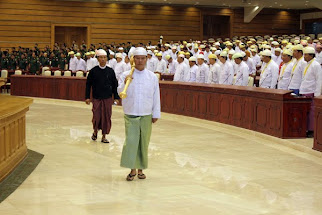Throughout our discussions we have been hearing about the remarkable changes underway, particularly the return of opposition parties to Myanmar’s political scene. An April 1 date for a parliamentarian by-election has been set, and 47 political parties have registered. The National League for Democracy (NLD) alone has registered nearly two-dozen candidates to run in the election, including Aung San Suu Ski.
The pace of change here over the past week has been dizzying. The government of Myanmar and the Karen National Union signed a cease-fire agreement, which could lay the groundwork for ending what essentially has been a 50-year civil war. While there is no question that advancing national reconciliation with minority groups will continue to be a key challenge, the cease-fire is a major move in a positive direction.
The next day, the most significant release of political prisoners by the new government occurred — 651 prisoners were released, including leaders of the “88 Generation Students” group who protested against Myanmar’s military junta in 1988.
Within a day of these developments, the United States restored full diplomatic relations with Myanmar. As a next step, both governments will exchange representatives at the Ambassadorial level.
Since it embarked on a new course of “pragmatic engagement” with the government of Myanmar in September 2009, the United States has been consistent in communicating three key elements that needed to be met to move bilateral relations forward:
- Engaging in tripartite dialogue in support of national reconciliation
- Releasing political prisoners
- Allowing fair and inclusive elections
The restoration of full diplomatic relations was the right move at the right time. The United States has shown the government of Myanmar that it is ready to react quickly to concrete reforms. It also sends a message to the people of Myanmar that the United States is working to encourage the process of democratization during this fragile period of transition.
















No comments:
Post a Comment